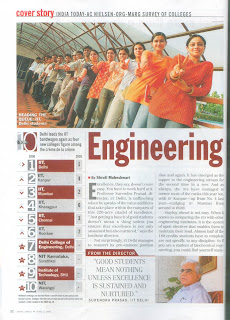I am writing this blog entry out of sheer desperation over the hopeless actions continually undertaken by our network administrators and providers in college.
I am a 4th year student of
BITS Pilani Goa campus. I have been studying here for more than 3 years. In today's world, network availability and quality internet access is indispensable for any sort of academic activity. Let me recall the issues that I am talking about:
- The entire college shares the internet over a 4 Mbps connection. This connection is further bifurcated through the use of multiple proxies for the faculty, staff and students. The exact bandwidth available to us is not made public, but I can vouch for the fact that a common google search, for which Google, Inc. takes 0.12 seconds takes well over 10 seconds to display on my room connection now, at 11pm today. (And it has been roughly the same almost every day).
- The internet access is unavailable in our hostel rooms from morning 9 to evening 5. Presumably this has been done to increase attendance in classes. If this were so, wouldnt cutting hostel electricity be the logical next step? Is it moral to restrict someone's right over a basic necessity for something like attendance? Why not just let the grade reflect the attendance issues and let internet and other rights be left alone?
- This semester, we have timed internet slots of 2 hours each, during which we get access to the internet - hostel wise. Did we know we were paying for this at the start of each year? Do we _want_ to pay for this? If low bandwidth is the problem, shouldn't a raise in the payments be an issue of debate? Shouldn't quotations be obtained from other service providers in search for the best deal? Have we seen any such attempt? I am afraid not.
- Up until a month ago, I couldn't search for 'tuberculosis' on the internet because of the censorship policy.
I couldnt search for 'chest cancer'.
Nothing with 'teen' included.
I couldnt apply to university of georgia because it had the phrase 'orgi' in it.
I cannot log on to orkut to join communities for placement discussions and project discussions.
Facebook has now been banned
I cannot update my Linux system (fedora) with online repositories because apparently their download links have banned phrases.
People have had to change their blog titles and had to rename sketches on their blog (remove the word 'Girl'!) to make sure they are accessible in campus.
I could go on, and this list runs into thousands...
I relied heavily on anonymous proxies to do this for me. And I'm not alone, a lot of my colleagues have to resort to it too. And given our bandwidth, imagine the patience that goes into such an effort. Add to that our growing censorship of these anonymous proxies by our self-proclaimed morality-keepers, the network administrators. - Our internal file sharing p2p network - DC (which has been the centre-stage of file search and information exchange in campus) - is in danger of being shut down because it is claimed (as per the notice put up), that it affects 'internet' bandwidth. I fail to see how much the internet bandwidth is affected by a p2p-based network which runs on a 100 Mbps network.
- I'm afraid that if this continues, whatever we share over the network may come under surveillance of network staff and if deemed inappropriate the network facility will close down.
I'm afraid that soon, there will be a day when each of our computers will be scanned for 'inappropriate' or 'banned' material.
As deplorable as it sounds, these actions are still tolerable if these bans were legitimate, but 'tuberculosis' , 'chest' , 'georgia' etc. being considered 'inappropriate' ??
Is this what we have come to?

It seems that internet usage and LAN are considered more of a privilege than a right in this campus. But are we, as students, paying for a privilege? Something that may be denied to us at the free whim of some external agency (These bans are suggested and implemented by the network admins, some of whom work for Wipro)?
Who decides the morality of these restrictive actions that affect our usage?
In any considerate society (and I believe ours is a considerate society), a person who pays for a service decides how best to use it. Shouldn't the people who pay for these services, decide how to use it best? This is how it should be, but morality creeps in, and in order to justify the incorrect actions the general fall-back claim is
'The students don't know what is right and wrong. By imposing restrictions, we prevent them from doing wrong things'
Two questions:
- Who decides right from wrong? Should it be the administrative staff who provide the connectivity?
- When the network admins say that a particular policy or a restriction needs to be taken to 'improve connectivity' or 'bandwidth' , are they always right? most of the times, 'NO'. There are many other ways of achieving better connectivity but those options have never been explored. My guess is that this is because our network admins are incapable of, or do not know all the different ways and do not wish to let this incapability be known to the general public. As a result, secrecy creeps in. They do whatever they want and claim it is the right thing to do. Haven't we already abandoned this kind of thinking long ago when the renaissance age crept in? Has there ever been an open debate in campus over this issue discussing these policies? I don't recall any.
Today, I was intrigued about the economic crises that have brought a lot of countries to the brink of bankruptcy.
I couldn't read the New York Times, because www.nytimes.com has been banned by our network administrators. This is what it says:
Access to the page: http://www.nytimes.com
... has been denied for the following reason:
Banned site: nytimes.com
You are seeing this error because what you attempted to access appears to contain, or is labeled as containing, material that has been deemed inappropriate.
Reading international news is considered inappropriate?
We are paying for this connection, not to be told that few of the most informative and educative sites are "inappropriate" for viewing. And by the way, who decides on the appropriateness of sites? If the network admins provide us with connectivity, does it automatically give them a right to
- control what we do with the connection?
- pry on our usage and violate our privacy?
- dictate moral terms on the usage of the connection?
As an analogy, does providing us with a hostel to live, automatically entitle the wardens to impose on us a lifestyle of their liking and self-proclaimed morality? (I'm not talking about socially acceptable norms). It obviously doesn't. And similarly issues of morality should be considered separately from issues of connectivity, service and bandwidth.
When the Local Area Network and the Internet were designed and made public, they were done so as to enable everyone to stay connected without bounds and restrictions. And the internet and even intranet networks today exist between many societies across the world.
Ours is a civilized society where we have rights and liberties and duties.
Recently, various international
human rights organizations, the
Internet Society,
Human Rights Watch, The
American Civil Liberties Union, the
Electronic Privacy Information Center, the
Association des Utilisateurs d'Internet and
other civil liberties and human rights organizations have joined together to create a
Global Internet Liberty Campaign (http://gilc.org). Two of their principles that I would like to highlight are:
- The Global Internet Liberty Campaign advocates prohibiting prior censorship of on-line communication.
- The Global Internet Liberty Campaign advocates insisting that on-line free expression (reading and writing) not be restricted by indirect means such as excessively restrictive governmental or private controls over computer hardware or software, telecommunications infrastructure, or other essential components of the Internet.
You can read more about the principles
here: http://gilc.org/about/principles.html
The GILC invites all aware and conscious global citizens like us to join them.
We invite you our fellow users from around the world who are interested in taking concerted action to protect the Internet to join us in this campaign.
I would definitely support the cause of this campaign. And in case you are an open and aware internet user, I would like you to do so too.
India is a free nation. We have laws of freedom and liberty applicable to all our citizens. And as 21 yr old citizen, I am entitled to my rights. I have the freedom of equality, of speech, of religion and many others... But before we speak about that, the spirit in which these liberties were designed, were such as to enable a person to reach his or her full potential. To lead a better, richer life. To live freely. Without restrictive boundaries and fear. And in order to protect these rights, we have an independent judiciary. Independent, to make sure even the government cannot step over the line. We are the world's largest democracy. And our current rise shows that our system is successful. We should be immensely proud of that. However the global internet liberty campaign has not yet made it into our legal system, but I think it is only a matter of time before a similar set of rights are incorporated(there are many agencies already campaigning for it within India). Until then, I would hate to see the lack of such rules or norms cause inappropriate restrictions in our campus.
Although I have criticized the restrictions and policies that we are facing, I'm sure the administrative staff and faculty don't bear any ill-feelings towards the students. There is a major lack of communication and uncertainty over the right course of action. There is a fine line between trying to impose a morally effective policy and crossing over the right to freedom, liberty and information of an individual. Although the actions are noble in spirit, they are restrictive in action. I believe that the network and internet should 'enable' a student to achieve and perform better, rather than 'disable' him/her.
And for this to happen I would like to see the following take place:
- Removal of all absurd and inappropriate timing restrictions for the internet.
- Availability of internet connectivity in hostels at reasonable speeds (which it certainly is NOT right now). There are two ways in which this can be done:
- Increase the bandwidth given the the ISP. This might involve increase in payments, and if this affects students' fee amount, a reasonable discussion should be put forth.
- Search for quotations from alternative service providers who provide better service.
In case this does not work out, then a reasonable and open debate about the restriction policy should decide the action to be taken.
- surveillance of activities of individual users on grounds of morality should stop.
- The connectivity staff should strive towards creating an open and free system in order to 'enable' every student in campus.
Although I have deep gratitude towards our alumni who provided us this connectivity through BITSConnect, I would like to point out the situation it is currently in. What was considered a luxury a decade ago is now a necessity, and we are being deprived of it. There is certainly something more to be demanded and done...
 I just finished an interesting book titled "Film As A Subversive Art" by Amos Vogel" which is considered to be among the most unorthodox film histories in history. The author was also the founder of the New York City avantgarde ciné-club Cinema 16 (America's most important film club 1947-1963).
I just finished an interesting book titled "Film As A Subversive Art" by Amos Vogel" which is considered to be among the most unorthodox film histories in history. The author was also the founder of the New York City avantgarde ciné-club Cinema 16 (America's most important film club 1947-1963).




